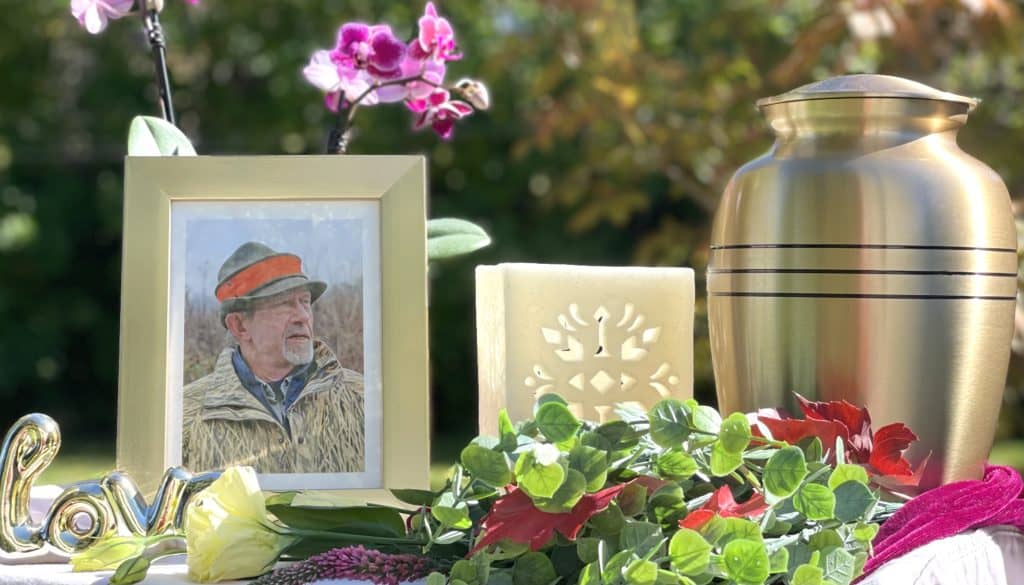In recent years, the US funeral industry has undergone significant transformation, driven by changes in consumer preferences, technological advancements, and economic pressures. This death care disruption reflects broader societal shifts towards more personalized, environmentally friendly, and cost-effective end-of-life services.
Let’s delve into these changes, focusing on the growing preference for cremation and the impact of corporate and private equity acquisitions. We will also look at some of the major players in this sector.
The Huge Shift to Simple & Affordable Cremation Services in the U.S.

One of the most notable trends in the US funeral industry is the increasing preference for cremation over traditional burial. This shift has occurred for multiple reasons. The cremation rate has doubled in the last ten years, and the National Funeral Directors Association (NFDA) reports that the cremation rate is expected to reach 82.1% by 2045, highlighting a profound shift in funeral practices.
Let’s explore the key drivers:
1. Cremation Costs: A direct cremation can cost less than $1,000.
Cremation is generally less expensive than burial. The average cost of a funeral with a viewing and burial can exceed $8,000, while a funeral with cremation is significantly cheaper, often by about $2,000 less when considering basic services. This economic advantage has become particularly appealing during recent times of financial strain or when families are looking to control costs.
2. Environmental Considerations: Cremation can be considered more eco than traditional burial.
With increasing awareness of environmental issues, cremation is often seen as a more land-efficient option. However, traditional cremation has a significant carbon footprint due to the use of fossil fuels, prompting interest in alternatives like aquamation or alkaline hydrolysis, which use less energy and produce less pollution.
Read our Guide to Aquamation or check out Water Cremation locations across the U.S. to learn more about the growth of this sustainable water cremation alternative. Although it costs more than a direct flame cremation, water cremation generally costs between $2,000 and $3,000.
If gas prices and inflation continue to drive flame cremation costs up, water cremation could be an equitable, affordable alternative.
3. Cultural Shifts: A decline in traditional funeral rituals & a preference for simplicity.

The decline in religious observance in recent years has reduced the adherence to traditional burial practices. Many now prefer the flexibility that cremation offers, allowing for memorial services to be held later or for ashes to be scattered in meaningful locations.
Families can save on funeral costs and be more in control of any memorial service, tribute, or life celebration event. Memorials can be held anywhere and personalized in a myriad of ways, which appeals to baby boomers and Generation X, who seem less concerned with a need for tradition.
Also, with families more dispersed than ever, the notion of a fixed memorial location, such as a grave plot, has become less valued. Cremation memorial artifacts enable families to move and keep their loved one’s personal cremation memorabilia with them. Be it an urn, necklace, wine glass, or garden ornament.
4. Space Limitation: Cemetery plot availability and costs in Major Cities

Some urban areas today face limitations in cemetery space, so cremation is a more practical solution. This is particularly relevant in cities like New York, where land is at a premium, as limited cemetery plot availability has also driven up plot prices. In Green-Wood Cemetery in Brooklyn, NY, a burial plot starts at $21,000.
Now, we need to examine behind the scenes of the industry. Most consumers are unaware of the power, money, and dynamics of a $20 billion-plus industry.
The Corporate Acquisitions, Death Care Market Dynamics, & the Integration of Technology in the Funeral Industry.
The funeral industry has seen a wave of consolidation, with large corporations acquiring smaller, often family-run funeral homes. Service Corporation International started this trend some 50+ years ago.
The Goliath of Funerals – Service Corporation International (SCI):
As the largest death-care corporation in North America, SCI has been at the forefront of this consolidation. In 2008, SCI acquired Alderwoods; in 2013, it bought Stewart Enterprises, significantly expanding its footprint. SCI now operates over 1,400 locations, including funeral homes, cemeteries, and crematories across the US and Canada, with revenue exceeding $4 billion in 2023. SCI also operates the largest direct cremation company in the U.S. – Neptune Society.
The Neptune Society was originally established in 1973. Over the years, it has expanded to more than 60 locations nationwide and plans to continue growing.
The Economic Impact of Acquisitions on Local Markets & Funeral Consumers.

These acquisitions often result in economies of scale, where operational efficiencies are achieved through centralized management and resource sharing. However, they also lead to concerns over pricing power and loss of local, personalized service.
While SCI dominates, other large players like Northstar Memorial Group, Smart Cremations, Foundation Partners Group, and Newcomer Funeral Service Group also contribute to the corporate landscape, offering services on a significant scale. This concentration of ownership has led to a market where large corporations control a substantial portion of funeral services, influencing pricing and service offerings.
Often, these players will acquire enough funeral service locations in an area to control the market price for funeral and cremation services. With their economies of scale and resources, they can reduce cremation prices below market level and drive small mom-and-pop funeral homes out of business. Then, of course, they will increase prices and control their market share of cases from an area.
The Challenges and Innovations Driven by Technology & Regulation.

The funeral industry isn’t just about mergers and market shares; it’s also about adapting to new consumer expectations and technological advancements:
The Funeral Industry is Now Rapidly Adopting Technology Integration to Evolve.
Virtual memorials, live-streamed services, and digital tools for planning funerals have become more prevalent, especially after the COVID-19 era, which forced many families to connect virtually during memorials. This tech trend caters to a digitally savvy clientele seeking convenience and flexibility.
Many funeral service providers now offer the option of arranging a direct cremation online. This helps them reduce staff costs, which they can pass on to a family wanting a simple cremation without a ceremony.
A plethora of tech companies now support the funeral industry’s adoption of modern operations, including websites, online arrangement platforms, QR tracking technology for crematories, live-streamed funeral services, and online memorial platforms.
The Pursuit of Personalization and Eco-friendly Funeral Options

Funeral homes now offer personalized services, from themed funerals to eco-friendly burial options like biodegradable urns and natural organic reduction (human composting). These services respond to a public that increasingly values individuality and environmental consciousness in death care as in life.
Regulatory and Transparency Issues: A Revision of the FTC Funeral Rule.
The Federal Trade Commission’s Funeral Rule aims to protect consumers from unfair practices, but there’s ongoing debate about its effectiveness and the need for more transparency in pricing and services. Recent proposals might push for digital price disclosures, potentially revolutionizing how consumers shop for funeral services.
Each state has a funeral licensing Board that regulates the funeral profession, but these regulations can vary significantly by state. This can make it very confusing for funeral consumers, with some states having potentially hindering archaic rules.
For example, in New York, a funeral home cannot own and operate a crematory. All crematories are not-for-profit entities, sometimes municipal, underfunded facilities, sometimes not even well-maintained. [This was highlighted in New York during COVID when the municipal crematories could not manage the increased volume of cremations and had maintenance issues due to having older equipment.]

Indeed, several funeral homes in New York offering affordable direct cremation are transporting their cases to crematories in New Jersey for cost and efficiency.
New York also requires that only a licensed funeral director collect and transport a body.
Several states still have outdated statutes that dictate a family must employ a funeral director even if they wish to conduct their own simple funeral service. Visit this post to read about the ten states that require a funeral director’s involvement even for a family-led home funeral.
Other archaic regulations are slowly being challenged and eliminated, such as the requirement for an embalming room when embalming is not legally required in any state. Some states prevent funeral homes from serving food and drinks or dictate that the funeral home must be named after the licensed funeral director/owner.
What is the Role of Major Funeral Companies in the Evolving Death Care Landscape?
Let’s take a look at how some of the largest companies shape the industry:
Service Corporation International (SCI)
Beyond its size, SCI influences industry trends through its vast network. It has introduced numerous brands like Dignity Memorial, which offers various traditional and contemporary services that cater to various economic segments.
SCI’s large-scale acquisition led it to operate under different brands to cater to all market segments, from National Cremation as a budget brand, Funeraria Del Angel to capture the U.S. Spanish-speaking population, to LHT Consulting delivering funerals of distinction to the celebrities and politicians.
During their major acquisition of small funeral homes, they retained the local funeral home name and just added the Dignity Memorial brand. Most local families are likely still unaware they are dealing with a corporate death goliath with their local funeral home.
SCI’s business model also includes significant pre-need sales and secures future revenue, which has helped to make it the industry titan it is today.
Change on the Horizon: The Private Equity Take-Over of the Industry of Death

The latest trend in death care acquisition seems to be stealthily emerging from the private equity investment sector. There is an upcoming increase in the death rate over the next few years as the baby boomer generation reaches their end-of-life era. This has driven an interest by equity investments to enter the death care sector. Especially with the opportunities offered by online cremation companies and the changing landscape of the funeral industry.
Companies like Foundation Partners Group (FPG) are backed by private equity. They focus on acquiring funeral homes in regions with high cremation rates, aiming to increase market share while adapting to consumer trends toward cremation. Access Holdings and Sterling Partners are the titan private equity investors backing FPG.
FPG acquired Tulip Cremation and Cake to merge their traditional cremation brands and offer a modern online platform for funeral arranging. Founded in 2010, FPG now operates in 21 states with over 260 locations.
Earlier this year, Homesteaders Life Company and Birch Hill Equity Partners purchased Park Lawn Corporation in a $1.2 billion deal. Park Lawn operates in 17 States and 2 Provinces, with around 245 funeral locations.
In a different move, Hillenbrand sold its Batesville Casket Company last year to a private equity company for a reported $800 million, and Batesville recently acquired Halcyon Death Care Management Systems.
After Services, a new direct cremation company in the U.S., secured $4 million in seed investment from Matchstick Ventures, with participation from ROTR Seed Fund, Sweater Ventures, TEN13, and Breaktrail Ventures, to launch its modern vision of cremation service arrangements.
Eirene Cremations, founded in 2019 and operating a similar model to After Services, received a reported $4.1 million in additional funding from private equity investors* in April this year to expand its operations. However, by August, it had quietly ceased trading and disappeared, demonstrating that the tech online model is not guaranteed success.
In the eco-tech sector, Earth Funeral received $10 million (2022) in private equity investment for its revolutionary concept and facility in Nevada. The facility offers human composting services for soil transformation.
DFS Memorials LLC launched in 2012 with a mission to change the funeral industry’s landscape by offering bereaved families a more economical alternative to traditional funeral services. Founded by a husband and wife team who also run US Funerals Online, DFS Memorials recognized a shift in cultural attitudes towards funerals. People were increasingly looking for less extravagant, more cost-effective ways to honor their loved ones without the financial strain that often accompanies traditional ceremonies.
DFS Memorials origins began as a conviction to innovate the stoic funeral industry in 2012. At a time when many in the industry believed cremation was a ‘fad’ that would pass, it was still common for a funeral home not to have an online presence or website.
Today, DFS Memorials operates as a network of affiliate locations nationwide, offering low-cost, transparent pricing. The network consists of around 135 providers serving 45 states in the U.S. and 4 Provinces in Canada. The majority of locations have served as affiliates of the network since its inception. DFS Memorials remains independently owned and operated by the Ille Family.
These companies all demonstrate the power of consumer demand to modernize the funeral sector. By offering better clarity in transparent service pricing and simple no-ceremony alternatives, they significantly bring down the cost of funeral services and enable families to lead in their preferences.
We are a nation of online shoppers who expect to be fully disclosed about prices. The demand is for affordable, no-fuss, easy-to-arrange, eco-friendly, and completely customizable death care.
The funeral industry is being dragged (kicking and screaming for most) into the new era of modernity. This is why the new key players in the field are disrupting. Consumers want cremation. They want to compare prices and get the best price for their purchase, just like we do as consumers in any other sector. Would you buy a TV or a car without comparing prices for the same model from different providers?
A Glance into the Future of the Funeral Industry

The US funeral industry is at a crossroads, balancing tradition with modernity. The shift towards cremation reflects not just economic and environmental considerations but also changing cultural attitudes toward death and memorialization. Corporate acquisitions have reshaped the landscape, bringing both benefits like efficiency and concerns regarding cost, market control, and personalization.
As the industry continues to evolve, it must address these challenges while embracing new technologies and sustainable practices. This transformation will ensure that how we say goodbye to our loved ones will continue to be as diverse and individual as life itself.
This ongoing evolution in the funeral industry reflects societal changes and prompts a reevaluation of how we handle death. It ensures that practices meet contemporary needs while respecting the sanctity and individuality of each life remembered.
*Eirene investors: Michael Katchen of Wealthsimple, Manica Blain of Top Knot Ventures, Relay Ventures, Saint Elizabeth Healthcare, & Export Development Canada.
#FuneralIndustry #CremationTrends #ModernMemorials #GreenFunerals #DeathCare #AffordableFarewell #EcoFriendlyFunerals #CorporateInfluence #CremationNation #ChangingTraditions #EndOfLifeServices #FuneralInnovation #SimpleFarewells #DirectCremation #MemorialRevolution #SustainableGoodbye #FuneralTech #PersonalizedFarewell #FuneralCosts #FutureOfFunerals

